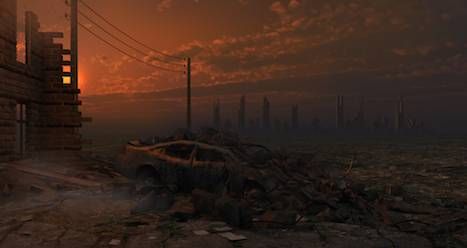
Is Dystopian Fiction Failing Our Globalised World?
We live in a globalised world, but all too often it doesn’t seem like books exist in this globalised world with us. Sometimes, books seem cut off from our reality altogether. This seems especially true lately, of dystopian fiction – which at its core is supposed to examine societal and political oppression. But often, this examination seems to only exist for straight, white people, with everyone else existing as a mere afterthought.
In more recent years, dystopian fiction has gotten better in terms of considering more intersections of oppression. With books like Margaret Atwood’s The Handmaid’s Tale, we’ve been exposed to the kind of targeted repression that women may face. But even that has come under fire for using black lives as an afterthought – or worse, as a tool to center the lives of white women.
More recently, I decided to read The Power by Naomi Alderman, and was disappointed at its failed attempts at creating a globalised dystopia. While I had to appreciate the fact that Alderman didn’t try to situate her entire novel within the closed-quarters of the US, or the UK, as many novels do, she seemed to give way to much stereotypical representation.
The Power is a novel that creates a world where a certain power – the ability to emit electric currents – is arisen within women. First, it begins to show in teenage girls, who can arise the power in adult women, until anyone born a female has a skein that can generate this power. Unsurprisingly, this power flips the power dynamics of the entire world, sending everything into a flurry, and creating fast change.
The book features three main female characters who appear again and again: Allie (who later becomes Mother Eve), Roxy, and Margot. The fourth main narrator, Tunde, is a male journalist who has the privilege of going country to country in order to record the change in the world as this power takes hold. Which is exactly where Alderman seems to fail a globalised narrative. Instead of committing to creating a world where readers are introduced to women from various parts of the world and their experiences with this new power, we are instead given strange, voyeuristic gazes into all non-Western countries via Tunde.
His foray into Saudi Arabia leads him to a group of rioting women, who seem less interested in their previously repressive statuses in the country, and more interested in having sex with the first man that comes to sight. In a strange scene during a Saudi riot, the women tell Tunde that they will have no man march with them, but when he assures them he is with CNN, they urge him to strip down to his boxers to check that he isn’t carrying anything. The scene in question becomes incredibly predatory, as all the women audibly gasp – as if no Saudi woman has ever seen a man without clothes on before! This apparent sexual repression is only further established when Noor – the only named Saudi woman – drags Tunde into her apartment at the first chance, takes off his clothes and equates the phrase “I am a free woman” with sexual intercourse with an unknown, non-Saudi man.
Not that I have a particularly keen interest in the sexual (or not sexual) interests of Saudi, or not Saudi, women, but the issue becomes even more jarring when the book continually links women’s new-found power to existent rape culture in our world today. For Allie, in particular, and the women-led country that becomes established later on in the book, the power becomes a response to the sexual atrocities that had previously been committed against them. In fact, the parallels between the power, and rape culture are constant: “could it be that boys like it? Is it possible they want it?” Quotes like this are used to reinforce a world where women have the upper hand, where they can enforce the power on men, and claim that they did, in fact, want it. In the same way that rape, and rape culture, is enforced in our world today.
To leave non-Western women out of that dialogue seems almost cruel – especially since Asia, Africa, and South America have high rates of sex trafficking victims. It’s even more cruel to actually make non-Western women predatory, and to equate their “freedom” with sex. It reduces Eastern women to stereotypes where they’re sexually repressed, or even unaware and unable to control their sexuality. It leaves them out of a discourse of sexual violence where they are often the victims of it in real life.
On the other hand, Western women are provided nuanced dual narratives in sexuality. They can exist as both the victims of sexual violence, and be the ones in control of their sexuality. They are not pigeon-holed to one story, or one voyeuristic male gaze.
This is not to say that the narratives of the women in the West throughout The Power weren’t moving, and that it wasn’t an important and interesting story. But once more, it seems that dystopian fiction doesn’t live up to the reality of our global realities, instead letting it become an afterthought again.








